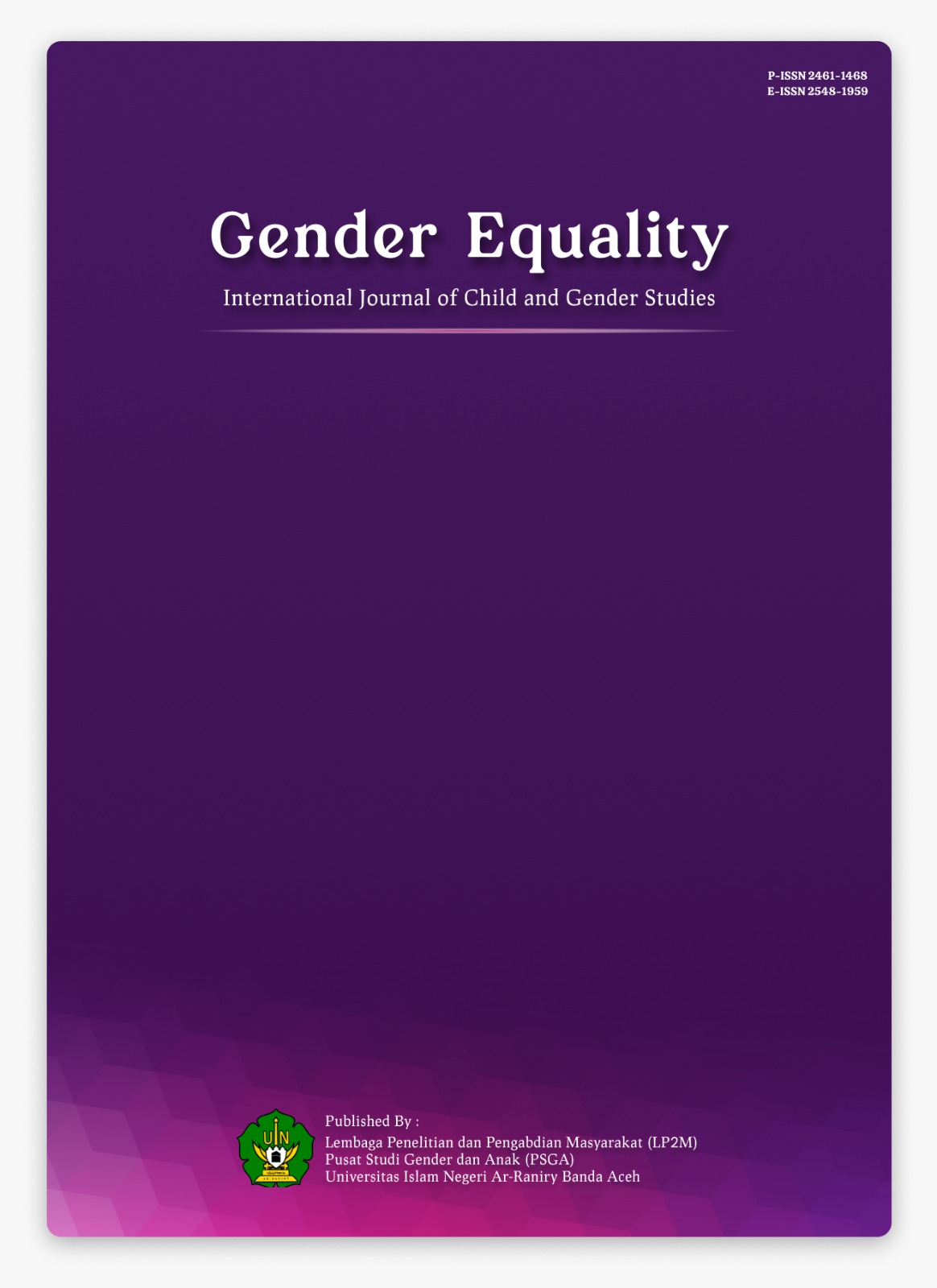The existential quest for freedom: Resistance and self-determination in Naguib Mahfouz’s Miramar
DOI:
https://doi.org/10.22373/equality.v11i2.32003Keywords:
Naguib Mahfouz, Existential Feminism, Simone de Beauvoir, Psychological Liberation, Gender RolesAbstract
This study analyzes Naguib Mahfouz’s novel Miramar through the lens of existential feminism, focusing on the character of Zahra representing a young woman who struggles to free herself from the social, psychological, and cultural constraints that limit her freedom. This research employs a qualitative descriptive-analytical approach by examining Zahra’s actions, dialogues, internal monologues, and character development throughout the story. Simone de Beauvoir’s existential feminist theory is applied to explore themes of freedom, self-determination, and resistance against patriarchal hegemony. The findings reveal that Zahra’s rejection of an arranged marriage, her courage to leave her hometown, and her commitment to working at the Miramar pension symbolizes her existential struggle. Zahra also faces intimidation, discrimination, and harassment from male characters, yet she continues to maintain her dignity and control over her life. This underscores her struggle to gain bodily autonomy, identity, and a future of her own. By depicting Zahra’s determination to achieve economic independence and personal development, Mahfouz offers a social critique of gender inequality and the restricted roles of women in post-revolutionary Egyptian society. This study concludes that Miramar is not merely a portrait of Zahra’s personal conflict but also a powerful commentary on class, identity, and women’s struggle to create the meaning of their own lives. The study highlights the relevance of existential feminism in understanding the dynamics of women’s freedom and resistance in modern literature.
References
Al Arkoubi, K., & Wollack-Spiller, G. (2023). The journey of career resilience among women. In Personal, Educational and Organizational Transformation: Leading During Times of Metacrisis (pp. 331–346). London: Springer.
Baumeister, R. F. (1999). The self in social psychology. psychology press. Retrieved from https://books.google.co.id/books?id=ZiQtTi6_RC0C
Burr, V. (2024). Social constructionism. Oxfordshire, UK: Taylor & Francis. Retrieved from https://books.google.co.id/books?id=zYkhEQAAQBAJ.
Butler, J. (2011). Gender trouble: Feminism and the subversion of Identity. Oxfordshire, UK: Taylor & Francis. Retrieved from https://books.google.co.id/books?id=2S0xAAAAQBAJ
Creswell, J. W. (1998). Qualitative inquiry and research design: Choosing among five traditions. London: SAGE Publications. Retrieved from https://books.google.co.id/books?id=bjO2AAAAIAAJ
De Beauvoir, S, & Parshley, H. M. (1997). The second sex. New York: Vintage. Retrieved from https://books.google.co.id/books?id=hPv5r4hcM3EC
De Beauvoir, S. (2023). The second sex. In Social theory re-wired (pp. 346–354). London: Routledge.
Hasyim, F., Indriani, Y., & Sayekti, W. D. (2022a). Analysis of gender roles in agro-industrial workers’ families. Gender Equality: International Journal of Child and Gender Studies, 8(2), 238–247. https://doi.org/10.22373/equality.v8i2.14710
Hasyim, F., Indriani, Y., & Sayekti, W. D. (2022b). Analysis of gender roles in agro-industrial workers’ families. Gender Equality: International Journal of Child and Gender Studies, 8(2), 238-247. https://doi.org/10.22373/equality.v8i2.14710
Holqi, F. G. F., Regita, A. S., Aprillia, A., & A’yun, I. Q. (2024). Analyzing gender equality in the US and Indonesian parliaments through liberal feminism theory. Gender Equality: International Journal of Child and Gender Studies, 10(1), 104-117. https://doi.org/10.22373/equality.v10i1.22688
Kasket, E. (2017). At the existentialist cafe: freedom, being, and apricot cocktails. Existential Analysis, 28(2), 419–423.
Langley, H. (2024). Freedom and agency in the second sex. European Journal of Philosophy, 32(1), 100-113. https://onlinelibrary.wiley.com/doi/pdf/10.1111/ejop.12841
Mahfouz, N. (1992). Miramar. Knopf Doubleday Publishing Group. Retrieved from https://books.google.co.id/books?id=vzNODwAAQBAJ
May, R., & Yalom, I. (2005). Existential psychotherapy. Boston: Thomson Brooks/Cole Publishing Co.
Naser, S. J., Ghandeharion, A., & Torghabeh, R. A. (2021). Twinning existentialism and feminism: The intersection of philosophy and social science in literary criticism. The First National Conference on New Perspectives in Interpreting and Translation Studies and Teaching English as a Foreign Language.
Piantanida, M., & Garman, N. B. (2009). The qualitative dissertation: A guide for students and faculty. California: SAGE Publications. Retrieved from https://books.google.co.id/books?id=1bYLKAh5YnIC
Pratt, N., & and Richter-Devroe, S. (2011). Critically examining UNSCR 1325 on women, peace and security. International Feminist Journal of Politics, 13(4), 489–503. https://doi.org/10.1080/14616742.2011.611658
Sartre, J. P., & Richmond, S. (2021). Being and nothingness. New York: Atria Books. Retrieved from https://books.google.co.id/books?id=Xj5qDwAAQBAJ
Tong, R., & Botts, T. F. (2024). Feminist thought: A more comprehensive introduction. Oxfordshire, UK: Taylor & Francis. Retrieved from https://books.google.co.id/books?id=ZkkSEQAAQBAJ
Downloads
Published
Issue
Section
License
Copyright (c) 2025 Anshar Zulhelmi, Siti Aminah, Hasanuddin Tosimpak, Khairul Rifqi, Luthfi Muhyiddin

This work is licensed under a Creative Commons Attribution-ShareAlike 4.0 International License.
GENDER EQUALITY: International Journal of Child and Gender Studies allows the author(s) to hold the copyright and to retain the publishing rights without restrictions. Authors who publish with this journal agree to the following terms:
- Authors retain copyright and grant the journal right of first publication with the work simultaneously licensed under a Creative Commons Attribution License that allows others to share the work with an acknowledgment of the work's authorship and initial publication in this journal.
- Authors are able to enter into separate, additional contractual arrangements for the non-exclusive distribution of the journal's published version of the work (e.g., post it to an institutional repository or publish it in a book), with an acknowledgment of its initial publication in this journal.
- Authors are permitted and encouraged to post their work online (e.g., in institutional repositories or on their website) prior to and during the submission process, as it can lead to productive exchanges, as well as earlier and greater citation of published work.



